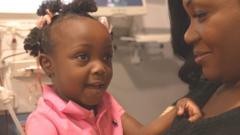41 minutes ago
About sharing
Destiny-Rae, who is five, is a record breaker.
Her kidneys stopped working properly when she was 10 months old, making her the youngest patient to go on dialysis at Great Ormond Street Hospital.
She’s had to visit there three times a week for five-hour sessions of the treatment.
That adds up to nearly six months of her life rigged up to the machine – another hospital record as the longest time yet for someone so young.
Despite being on the transplant waiting list for years, the odds were stacked against her getting a new kidney.
People from the same background are more likely to be a good blood and tissue match.
But none of her family can donate and there is a national shortage of organs, particularly from donors belonging to ethnic minorities.
In desperation, her mum, Maria sought friendship and support in a chat room.
And by sharing her story, she met “guardian angel” Liffy, who was willing to donate a kidney to a special organ-swap scheme.
Liffy is not a match for Destiny either – but her generosity resulted in Destiny receiving a kidney from another kind stranger who is.
Maria, Destiny and Liffy invited BBC News to film as they found out if the UK Living Kidney Sharing Scheme, run by NHS Blood and Transplant (NHSBT), had managed to match them up with someone else – perhaps another parent who cannot donate a kidney to their own child who needs one.
This was their third attempt, or matching round.
Maria told me: “You can never force someone to willingly give you a kidney, because it’s literally an operation they don’t need. So I’m very understanding.
“It’s a lot. It’s not an easy choice.”
‘My inspiration’
Without a transplant, Destiny’s future would be uncertain, other than lots more dialysis.
“It’s sad because that’s her life,” Maria says.
“Whereas other kids, maybe they get to go to do ballet or gymnastics… she doesn’t.
“But she’s strong. She’s fierce. She’s intelligent. She’s my inspiration.”
Massive decision
When Liffy heard about Destiny, she immediately wanted to help.
“What really stuck out to me was that Destiny was actually the same age as my own daughter,” she says.
“And I couldn’t imagine being in the same situation as Maria and Destiny and someone not wanting to help.”
A healthy donor, like Liffy, can lead a normal life on one remaining kidney – but it is a massive decision.
“It’s quite hard for people to get their heads round why I would donate my kidney to someone I’m not related to, to someone that I’ve not known for a huge amount of time and also someone that I’ve met online,” she says.
“If I was ever in the same situation, I’m 100% sure someone out there would do what I’m doing.
“You know, it’s not even something for me. I think it would mean the most to be being able to see Destiny grow up a healthier, happier little girl.
“That’s enough for me.”
Meanwhile, Maria says about Liffy: “She’s literally sent from heaven.
“She’s my guardian angel.”
Matching runs
The UK Living Kidney Sharing Scheme uses algorithms to match the 300 recipients registered at any one time.
And four times a year, NHSBT carries out matching runs to find the best combinations of recipients and patients.
The scheme is anonymous and confidential – people do not know who their donor or recipient is.
And swaps go ahead only if every pair – up to three in total – can be matched. No patient misses out.
In the UK, about 5,700 people need a kidney transplant – 121 are children
Black patients wait an average of 10 months longer for a kidney than white, NHSBT figures show
The number of registered organ donors belonging to ethnic minorities has risen in the UK since the introduction of the optout system, in recent years
Under that system, all adults are considered to have agreed to donate when they die, unless they have said otherwise – although, the bereaved family is still consulted
About a third of all kidney transplants in the UK are from living donors – some 1,000 each year.
They offer the best chance of success, because the kidney comes from a healthy person.
Doctors never remove a kidney unless satisfied the risks are as low as possible.
The donor may stay in hospital for two to four days, depending on their recovery, and then need up to three months off work to recuperate, depending on their occupation.
They may be paid for expenses and loss of earnings but not for the kidney – it is a gift.
While I was there, Liffy told Maria she had received a phone call from the hospital, that morning, with the best news possible.
They had found a match.
And, a few weeks on, I can report (without breaking donor anonymity guidelines) that the operations have successfully gone ahead and Destiny is now recovering at home.
She cannot wait to start swimming lessons and wants to go to Disneyland – the first real holiday she will have had, because the dialysis routine has been so restrictive.
Liffy may never meet the person who received her kidney – but, to her, it does not matter.
“It would be lovely to see the face and see the person you have helped – but that aside, I know I’m going to see the face and see the person that I helped, because I see Destiny all the time,” she told me.
“She calls me Auntie Liffy and I love it.
“I’ve met like all of Maria and Destiny’s family.
“They’ve also met mine. And my two children adore Destiny.
“They know that what Mummy is doing is going to help Destiny. They’re super-happy with it.”
About 60,400 people in the UK today are alive thanks to an organ transplant.
Additional reporting by Nicki Stiastny and Philip Coldrey
22 September 2023
2 October 2022
